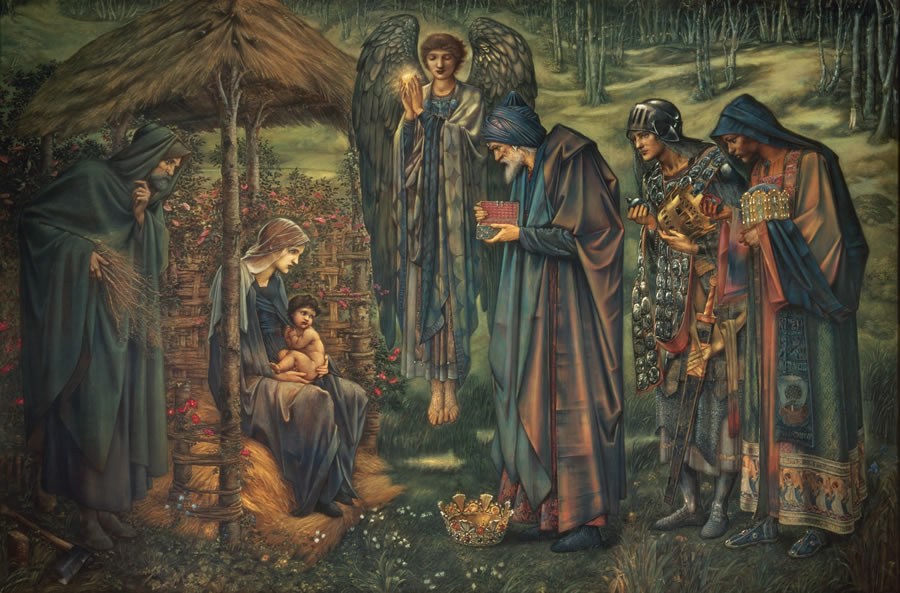
The Power of the Vulnerable is Love
by Deacon Jeff Strom | 01/05/2023 | Images of FaithMagi from the east arrived in Jerusalem, asking, “Where is the newborn king of the Jews?” When King Herod heard this, he was greatly troubled, and all of Jerusalem with him. Jesus, the baby king, is more powerful than Herod and all the kings, dictators, presidents, and rulers of our world. The power of the powerless is love—in our Lord’s birth and in the vulnerable today. The power of the vulnerable is love, including in our parish. Writing about the vulnerable, Chris de Vinck told how his brother Oliver was born profoundly disabled in New Jersey—blind, crippled, incapable of speaking or even chewing solid food. He would never learn, run, or hold a fork.
For 32 years, Oliver lay on his back in a bed in the second room down the hall to the right. Outwardly, he could do nothing except eat, breathe, sleep, and, occasionally, laugh. Chris had thought that everyone had a brother like Oliver. He was part of the family, just like everyone else. Taking care of Oliver was part of the normal family routine.
Oliver brought surprising gifts into his mom’s life. Her initial response was to weep in her pillow, hiding her tears and grief and sadness from her family. Yet because of Oliver, his mom began asking bigger questions: Why these trying circumstances of life? Why to her family? What is the meaning of its mystery? How do we live knowing what could have been versus what is? But how does one measure the love from Oliver’s laugh, the color of his eyes, and the feel of his skin? Most of us will know this sort of pain at some point in our lives. But would we have the courage to stick with someone like Oliver? How about an adult daughter born with a rare brain disorder, two grown foster kids from a drug-addicted mom, or a Down syndrome child? Could we love them for decades with all the impossible hurdles?
Could anyone have guessed that out of Oliver’s powerlessness, millions around the world would learn this modern parable when Chris wrote about his brother Oliver? Even Pope St. John Paul the Great and President Reagan responded to Oliver’s story and his family. Everyone saw the paradox that in his weakness, Oliver possessed great strength, the power of love. Vulnerability is lovable, and a reason can’t wipe away tears. Oliver survived for 32 years because others placed food at his lips. With each meal, Oliver was physically nourished. With each meal, everyone who fed him was spiritually nourished. In accepting Oliver for who he was, rather than lamenting what he was not, his mom rose to a new level of understanding that enriched her.
Confronted with emotional pain, or loss, or sadness, some give up. Some destroy all around them or push away everything good. Some lock hope away in a box in the attic and throw away the key. But then other people embrace their sadness and the possibility of peace, no matter how impossible it seems. Oliver’s dad was such a man. When asked how he managed to take care of Oliver’s needs, he just said, “It wasn’t 32 years. It was one day at a time. Can I feed Oliver today? Yes. Can I bathe Oliver today? Yes. Can I love Oliver today? Yes.” And because Oliver’s mom said yes to life, she had four more kids, passing along a vision many in our world would never understand. If we do not look for Christ, our hope in the sorrow, the sorrow will consume us, and we will perish. Academic truth based on dry, unfeeling logic would never have quenched Oliver’s thirst in a summer heat wave. Everyone saw the paradox that in Oliver’s weakness, he possessed great strength, the power of unconditional love, which is willing the greatest good for another. Vulnerability is lovable, and a reason can’t wipe away tears. Oliver and others multiply the love in our world.
Lord, we thank you for the power of the vulnerable. Show us the power of your love. Teach us how to love like you. And all God’s people said, Amen!
BACK TO LIST BACK